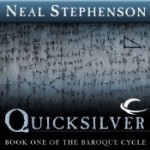
 The SFFaudio Podcast #091 – Scott and Jesse talk about the new Audible Frontiers audiobook Oath Of Fealty by Larry Niven and Jerry Pournelle.
The SFFaudio Podcast #091 – Scott and Jesse talk about the new Audible Frontiers audiobook Oath Of Fealty by Larry Niven and Jerry Pournelle.
Talked about on today’s show:
Footfall by Larry Niven and Jerry Pournelle, The War Of The Worlds by H.G. Wells, Robert A. Heinlein, The Godwhale by T.J. Bass, Half Past Human by T.J. Bass, overpopulation, genetic engineering, artificial intelligence, FROMATES (“Friends of Man and the Earth” – an anti-technology group of eco-terrorists), arcology, Todos Santos, Los Angeles, California, are arcologies a stepping stone to generation starships?, SimCity 2000, Sid Meier’s Civilization, architecture + ecology = arcology, Coruscant (the city planet), Tantor (the elephant), Trantor (the city planet), Tantor Media, Mega City One (Judge Dredd), being a free accountant for the government, bylaws vs. customs and culture, engineering, “we can’t write a story that is just setting”, Luke Burrage (of SFBRP), is a cruise ship an arcology?, the reality of reality vs. the dreams of utopia, “Crisis in utopia…”, existing means interacting, the hermit kingdoms, transportation, Zipcar, cultural vs. technological developments, living differently in an urban environment, arcology as shopping mall, security conscious vs. security theater, safety as a selling point, TSA, terrorism, a Heinleinian uncomfortablenesses, THINK OF IT AS EVOLUTION IN ACTION, “humanity is more than just one type of person”, what’s wrong with Oath Of Fealty, not unrealistic vs. realistic, eco-terrorism, resentment and the response to resentment is yucky in Oath Of Fealty, what are the references to blacks and lesbians doing in this book?, Job: A Comedy Of Justice, “the Disney connection”, Disney World, Walt Disney, Epcot, gated communities, Celebration (Florida), brain drain, Canadian immigration policy (is draining the third world of its best educated), colonizing Mars, Jerry O’Neill’s space colonies, “not anything like reality”, overpopulation, community tool libraries, Abu Dhabi, Dubai, Stephen Hawking, NASA spinoffs, spiritual reasons for space travel, Beijing olympics opening ceremony, cut the defense budget to actual defense, “we need an alien threat”, China’s moon program, McMurdo Station (Antarctica), Herzog’s Encounters At The Of The End Of The World, the Canadian (Sir George Reedy) is the most unrealistic thing in Oath Of Fealty, there are no knights for Canada, the Order Of Canada, the case of Conrad Black, House Of Tones blog (interview with Larry Niven and Jerry Pournelle), the role of GOOD editors, Robert A. Heinlein did the editing on The Mote In God’s Eye by Larry Niven and Jerry Pournelle (!), series aren’t a new thing, Anne Of Green Gables, The Great Brain, Tarzan, the Barsoom series, The Wizard Of Oz, expecting the series and not demanding the series is the cart leading the horse, John Joseph Adams (should be a guest on the SFFaudio Podcast), Orson Scott Card as an editor, Technovelgy.com’s Oath Of Fealty entry, the audiobook version of Oath Of Fealty, GLADOS, Portal, artificial intelligence, the speech recognition on the Google App is amazing (!), Google Goggles, cyborg, “BrainPal”, Old Man’s War by John Scalzi, telling Oath Of Fealty from a different POV, check out the DRAMATIS PERSONAE for Oath Of Fealty below, this book needs more average folks, Cory Doctorow, “a lot more agitation and a lot less Heinlein”, do it as a YA novel, UCLA, the Weather Underground, drink coffee while you waldo on the moon, slidewalk, The Moon Is A Harsh Mistress, The Caves Of Steel by Isaac Asimov |READ OUR REVIEW|, Lucifer’s Hammer by Larry Niven and Pournelle.

Dramatis Personae
Joe Dunhill — Probationary Officer, Todos Santos Security
Isaac Blake — Lieutenant, Todos Santos Security
Preston Sanders — Deputy General Manager, Todos Santos Independency
Tony Rand — Chief Engineer, Todos Santos
Arthur Bonner — General Manager, Todos Santos
Frank Mead — Comptroller, Todos Santos
Delores Martine — Executive Assistant to the General Manager, Todos Santos
Barbara Churchward — Director of Economic Development,Todos Santos
MacLean Stevens — Executive Assistant to the Mayor of the City of Los Angeles
Sir George Reedy — Deputy Minister of Internal Development, Canada
Genevieve Rand — Tony Rand’s former wife .
Alice Marie Strahler — Executive Assistant to Tony Rand
Allan Thompson — Student
Sandra Wyatt — Assistant General Manager, Todos Santos
James Planchet — City Councilman, Los Angeles
Mrs. Eunice Planchet — James Planchet’s wife
George Harris — Businessman and convicted tax evader
Thomas Lunan — Newsman
Amos Cross — Chief, Todos Santos Security
John Shapiro. LLD. — Counsel, Todos Santos
Samuel Finder, M.D. — Medical Resident, Todos Santos
Hal Donovan — Lieutenant, Robbery/Homicide, Los Angeles Police Department
Cheryl Drinkwater — Todos Santos resident
Armand Drinkwater — Waldo Operator
Glenda Porter — Tattoo Artist
Sidney Blackman — District Attorney, County of Los Angeles
Penelope Norton — Judge, Superior Court, State of California
Phil Lowry — Newsman
Mark Levoy — Publican; former Yippie
Ronald Wolfe — General, American Ecology Army
Arnold Renn, Ph.D. — Professor of Sociology, UCLA
Rachael Lief — Bulldozer operator
Mrs. Carol Donovan — Lt. Donovan’s wife
Vito Hamilton — Captain, Todos Santos Security
Vincent Thompson — Subway mugger
Posted by Jesse Willis

 John DeNardo, of the magnificent SFSignal blog, recently asked me to participate in another “Mind Meld.”
John DeNardo, of the magnificent SFSignal blog, recently asked me to participate in another “Mind Meld.”




